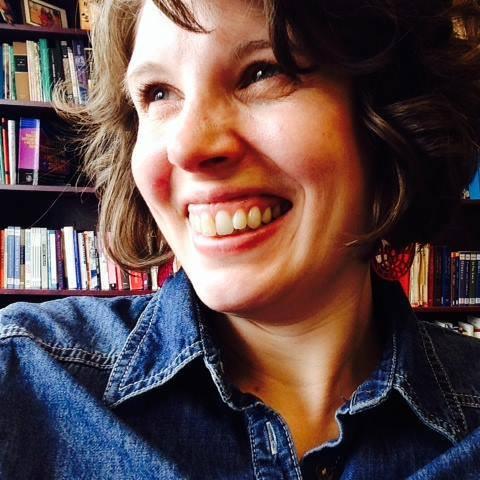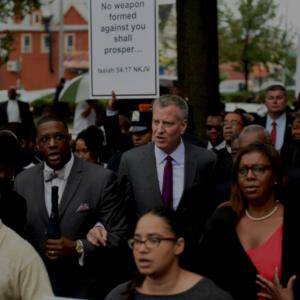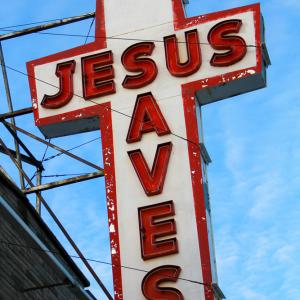
Christin Taylor is an author, a professor of writing, a mother, and a wife. Her latest book, Crew:Finding Community When Your Dreams Crash, released Fall of 2014. Her latest articles about identity and faith development have appeared in the NY Times column, Motherlode as well as the Huffington Post. She lives in Gettysburg, PA with her husband, and their two kids. You can read more about her and her writing at www.christintaylor.com.
Posts By This Author
Reconciliation in the Shadow of a Broken History

Image via momente/Shutterstock.com
Self-professed best friends, Anthony and Dustin have two very different energies. Anthony is compact, and speaks with vivid and pointed images that cut through the fog of misconception. His gaze is simultaneously direct and yet deeply reflective. Dustin emanates a good ol' southern boy vibe: easy grin, easy mannerisms, each movement relaxed and deliberate.
And then there is the one glaring difference between them: Anthony is black. Dustin is white.
Reconciliation Ground: Ministry in Public Schools

Image via Nadezhda1906/Shutterstock.com
The couple has found that part of their calling in these schools is not just to the children, but also to the teachers who serve those children. Cheryl has taken to performing regular acts of kindness for the teachers — showing up in the teachers’ lounge with a plate of cookies, or stopping by the main office to give a hug to the administrator in charge of discipline.
“I tell her, ‘I’m sure you’ve had a rough day today. Can I give you a hug?’ I just never knew it would make such a difference. [They] feel so supported,” said Cheryl.
Un-Haunted: Leaving Guns Behind in America

Image via TFoxFoto/Shutterstock.com
In the end, we didn’t choose a house in the sprawling metropolis that is Waterloo. We took a home in a small rural town just outside the city. It reminds me of rural Pennsylvania: quaint, quiet, with lots of room for the kids to run and play. We can walk to school, the library, and the downtown shops. Kids run our streets playing ball hockey, riding bikes — all unattended by adults.
My friends in this town groan about the fact that due to the new practice of locking school doors, they can’t walk their kids all the way into the building anymore.
“I miss being able to help Olivia take off her coat, hang up her bag, and get her ready for class,” Kirsten tells me.
I nod respectfully, but I’ve never gotten to know what they’re now missing.
I want to be smart about my relief. I know there are certainly many ways my children can get hurt, even here. Still, I’m so grateful that my friends don’t know what I’m missing from life down in the States. I’m so glad that when I drop Noelle and Nathan off at the school doors each morning, I leave un-haunted.
The White Church's Second Chance

Image via a katz/Shutterstock
And here suddenly the letter lurches forward in time, slides through decades and lands squarely in our laps in 2015. It seems almost as if he isn’t talking about men and women of the past, but about Michael Brown, Eric Garner, Clementa Pinckney, Sharon Coleman-Singleton … the list is so sickeningly long.
He goes on to record injustices in Birmingham: “There can be no gainsaying of the fact that racial injustice engulfs this community. Its ugly record of police brutality is known in every section of this country. Its unjust treatment of Negros in the courts is a notorious reality. There have been more unsolved bombings of Negro homes and churches than in any other city in this nation.”
Wait. What are we talking about? Birmingham, or Cleveland? Ferguson? Charleston?
“Letter from a Birmingham Jail” has always itched at me, unsettled me. It bothers me because King isn’t writing to political leaders, but religious leaders, people of faith, people who follow the same Jesus as me.
When Leaving Faith Means Finding It Again
I’ll never forget that conversation: the moment Amy predicted I would walk away from my faith. I was 26 at the time. She, 36. We sat at a rustic seafood restaurant on the beach. I stabbed my blacked salmon salad and chewed long and hard on her words.
“You remind me of myself 10 years ago,” she said.
She had been raised in a deeply religious family, and had been a devout Jew her whole life. Then around her 20s, she gave it all up. By the time I met her in her 30s, she called herself a “lapsed Jew,” disillusioned with the rules, the expectations, the rigorous doctrines.
I was the daughter of missionaries, raised in the Evangelical church, and deeply committed to my relationship with Jesus. Her words scared me. No, no, I prayed quietly. Jesus please don’t let me go.
Between Two Cultures: How to Be Evangelical Without Evangelizing
I occupy a strange place between cultures. Not the international cultures of my childhood spent as a missionary kid living around the world, but between two sub-cultures here in modern America. I am a rare breed of evangelical that doesn’t live in a bubble of Christian culture. Quite the opposite. I live and work in higher education, and — mark it — secular higher ed.
An evangelical acquaintance once asked me delicately, “Is there a reason you and your husband don’t work at a Christian university?”
I could hear the gears in his head as he tried to reconcile what he saw before him: two highly educated, devout Christians working in the "liberal bastion" of a secular college. Why on earth would we do such a thing to ourselves?
The truth is, Dwayne and I live and thrive in the place we’ve carved out outside the bubble of American evangelicalism. It’s not that we don’t love the evangelical church, or don’t attend an evangelical congregation.
It’s just that we don’t identify with all aspects of the American version of evangelicalism.
He and I both came to know Jesus outside the States. We are both missionary kids. In addition, Dwayne is Canadian. As a result, we have an outsider’s perspective. For us, living in America and being evangelical poses an interesting paradox.
In so many ways, living and working with people who have vastly different life experiences than our own feels normal. After all, that’s how we grew up — in the company of friends whose worldviews are shaped by the submerged iceberg of cultures not our own. These differences don’t threaten our beliefs. Ironically, holding the space for the lived experiences of our friends creates an environment that also affirms our lived experiences, and more importantly, our faith.

